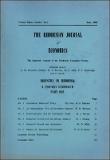| dc.contributor.author | Musset, B.H. | |
| dc.coverage.spatial | Zimbabwe | en |
| dc.date.accessioned | 2015-08-24T14:41:24Z | |
| dc.date.available | 2015-08-24T14:41:24Z | |
| dc.date.issued | 1969-06 | |
| dc.identifier.citation | Musset, B.H. (1969) Goverment's Industrial Policy. The Rhodesian Journal of Economics, vol. 3, no. 2, (pp. 7-15). UZ (formerly University College Rhodesia), Harare (formerly Salisbury): RES. | en |
| dc.identifier.uri | https://opendocs.ids.ac.uk/opendocs/handle/20.500.12413/6811 | |
| dc.description | A symposium paper on the then Rhodesia government's industrial policy, originally presented at symposium on Industry in Rhodesia, 11th and 12th June, 1969. | en |
| dc.description.abstract | The basic objective in the economic field of all Governments, but particularly of Governments of developing countries such as Rhodesia, is to achieve the maximum long term, rate of growth of the real wealth of the country. There are differences of opinion in the world today as to the best method of achieving this growth, and as to how the national wealth should be shared among the inhabitants of a country, but the aim of raising the standard of living of all citizens is common to all.
In Rhodesia, our economic philosophy favours the private enterprise, capitalistic system as against the centrally planned and controlled economy of socialism or communism. We believe that the greatest level of efficiency in production and distribution is achieved by free entrepreneurs who are motivated by the desire for profit. We do not attempt to plan the future course of the economy in more than broad outline because we believe that the alert merchant or industrialist will react more quickly to changing circumstances than any central planning machine and will extract the maximum benefit therefrom. Human nature being what it is, it is not practicable for Government merely to foster the conditions in which private enterprise can best operate and then keep out of the way; completely laissez-faire capitalism is a century or so out of date; and some degree of Governmental control is today accepted everywhere as necessary, but our tendency is to control as little as possible and to remove these controls if the need for them has passed. | en |
| dc.language.iso | en | en |
| dc.publisher | Rhodesian Economic Society (RES). University of Rhodesia (now University of Zimbabwe.) | en |
| dc.rights.uri | http://creativecommons.org/licenses/by-nc-nd/3.0/ | en |
| dc.subject | Development Policy | en |
| dc.subject | Industrial Development | en |
| dc.title | Goverment's Industrial Policy | en |
| dc.type | Article | en |
| dc.rights.holder | University of Zimbabwe (UZ) (formerly University College of Rhodesia) | en |


